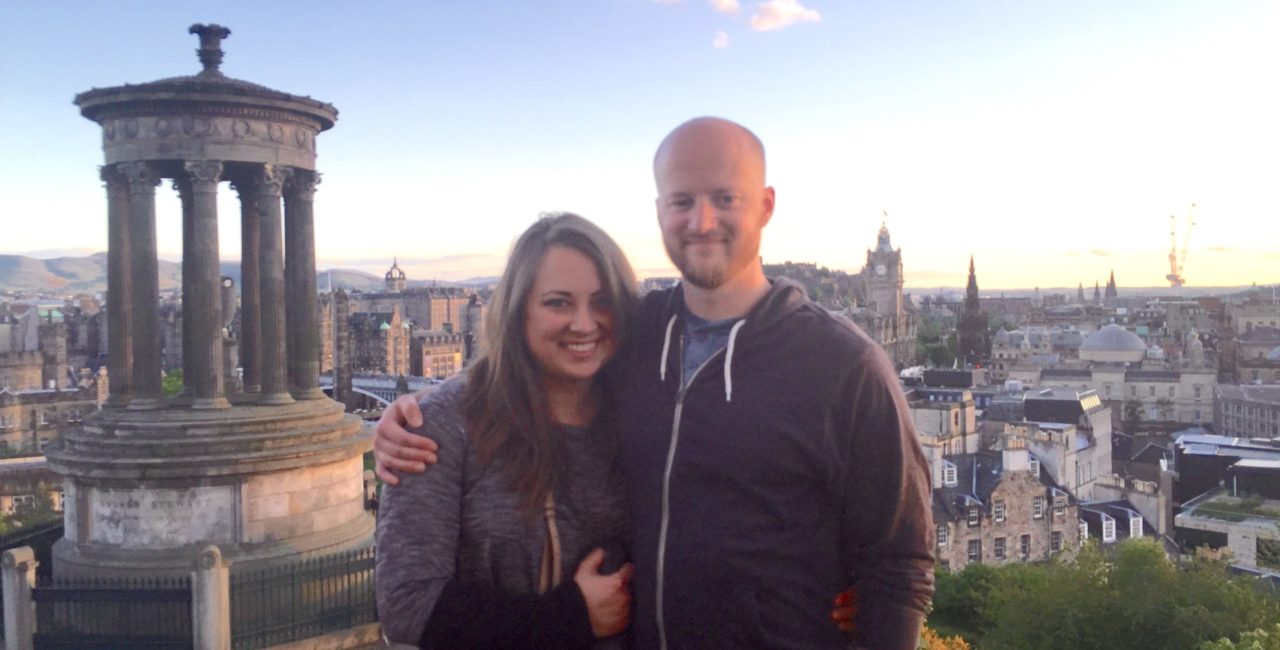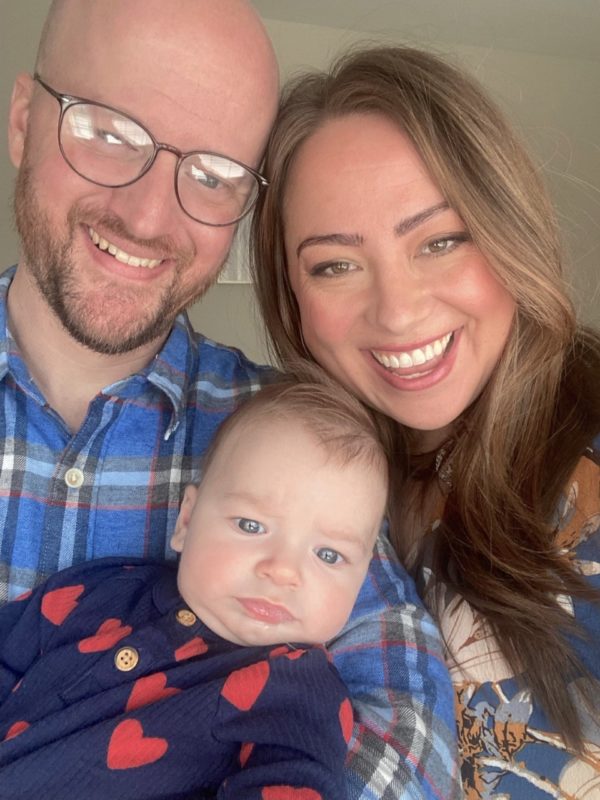
Seeing God’s hand in all things: seminary graduate finds joy
Dr. James T. “JT” Turner has seen God’s providence at work in serendipitous encounters and even in disappointing delays since completing his seminary studies for the Th.M. degree at Erskine in 2012. Gaining success in academic pursuits, including post-doctoral research, he became a full-time professor at Anderson University in 2018. The preparation of his previous studies and the excitement of ongoing academic research contribute to the fulfillment he has found in teaching.
Digging deep
The Th.M. program at Erskine Theological Seminary (ETS) gave Turner a strong start for his academic career. “The research component—the research thesis requirement—was particularly helpful going into my Ph.D. studies,” he says. “From my training at ETS, I learned well how to construct a research question and how to read through appropriate primary and secondary sources.”
One of his ETS professors at the time, Dr. Donald Fairbairn, advised him “to be the sort of scholar who reads the entirety of a source…rather than simply reading an abstract or merely pulling quotes,” Turner recalls. “This may sound like common sense, but unfortunately, many scholars don’t do this,” he says, and thus they miss contextual keys to an author’s meaning.
In his Th.M. thesis, Turner explored why patristic writers considering the afterlife made greater use of Plato’s metaphysics than Aristotle’s. The thesis topic gave him “a reason to research the interaction between ancient Greek philosophy and early Christian doctrine,” he says.
He began thinking about aspects of what became his doctoral dissertation while still at Erskine.
“In part, I came upon my research topic through a time of morning Bible study. There’s a seemingly odd exchange in Matthew 22 between Jesus and the Sadducees concerning the resurrection,” he explains. “It was in the stacks in the Erskine library that I first found a thinker who seemed sympathetic to my concerns—Martin Luther.”
Hurry up and wait

When Turner and his wife Bethany, a former Erskine College staff member, moved to Scotland for his Ph.D. work at the University of Edinburgh, a happy interlude began for the young couple. From the summer of 2012 to the summer of 2015, “We had an incredible church with a wonderful local community,” he says. “Edinburgh is a beautiful city surrounded by a beautiful country. I miss being there, our friends, the environment, and most things about it nearly every day.”
Turner finished his Ph.D. work in 2015 under the supervision of Prof. David Fergusson, now Regius Professor of Divinity at Cambridge University. He went on to do post-doctoral research with the “Analytic Theology Project” at Fuller Theological Seminary in California. “The analytic theology project was central to my success as a scholar,” he says. But there was an initial problem: he thought he would be joining the project in 2015-16, but it turned out he had to wait until the following academic year.
“In the summer of 2015, my wife and I moved back to Anderson from Scotland, thinking that we were heading to California in a matter of weeks,” he says. “Bethany’s parents live here, so we were bunking with them for what I thought was going to be a very short time.”
Multiple connections
On their first Sunday back in Anderson, the man giving the sermon in the church the Turners visited was a New Testament scholar and professor whom Turner had met, he says, “in God’s providence, the previous summer at a conference in Cambridge, England.”
When Turner learned he would not be joining the Analytic Theology Project in California until the next academic year, he asked his acquaintance from the Cambridge conference about adjunct work at nearby Anderson University, where the scholar was a member of the faculty.
“The folks at Anderson University in the College of Christian Studies came to know me through my adjunct work and through the local church we joined,” Turner says. “They let me know that they were going to starting a philosophy program in a few years’ time. As it happened, the program was to start in 2018, right when my time with the Analytic Theology Project at Fuller was set to end.”
During his time at Fuller, Turner strengthened his academic skills. “In God’s providence, he put me with leading thinkers in the budding movement—now quite large—within the theological academy,” he says. “Making connections of that sort allowed me to accomplish most of my scholarly achievements since 2016.”
Timing it right
One powerful aspect of Turner’s experience as a post-doctoral research associate on Fuller’s Analytic Theology Project was that it allowed him “two solid years of intense research and publishing, one full year of which was dedicated almost entirely to rewriting my Ph.D. dissertation for publication.”
As a research associate, Turner worked with Prof. Oliver Crisp, principal investigator, now Professor of Analytic Theology and Principal of St. Mary’s College at University of St. Andrews in Scotland; Dr. Jordan Wessling, now Assistant Professor of Religion at Lindsey Wilson College; and the Rev. Dr. James Arcadi, now Associate Professor of Biblical and Systematic Theology at Trinity Evangelical Divinity School.
Not only did he receive academic inspiration from the team at Fuller, but he was able to have his work reviewed by the team, “all of whom were top-notch scholars,” he says. “By the time I sent it off to a publisher, I had full confidence that it would get picked up and published.”
Turner’s dissertation, rewritten for publication and given the title On the Resurrection of the Dead, was published by Routledge Press during Turner’s time at Fuller. It was also during that time that he was appointed Book Review Editor for Philosophy of Religion and Analytic Theology with the Journal of Biblical and Theological Studies.
Rich rewards

Hired as Assistant Professor of Philosophy at Anderson University in 2018, Turner developed and launched the school’s philosophy program through the College of Christian Studies.
He still enjoys the research activity he learned to love at Erskine. He has published journal articles and book reviews; contributed chapters to edited volumes; presented research at conferences; been interviewed on podcasts; and been appointed Series Editor with Routledge Studies in Analytic and Systematic Theology. In 2021 he published, as co-editor with the Rev. Dr. James Arcadi, the T&T Clark Handbook of Analytic Theology.
How does all that research and writing tie in with teaching? “Teaching is very central to what I do now,” Turner says. “I believe the best teaching is fueled by keeping current with research in one’s field, and I’m able to do that. I like to think it makes my teaching up to date and dynamic.”
In introductory philosophy classes, Turner admits, “it’s often difficult to get non-majors excited about philosophy,” but for him, the fact that some do become enthusiastic about the subject “is a life-giving and life-affirming experience.” In the upper-level courses the students already love the subject, so teaching them is “a different sort of satisfying,” he says.
Years after his work as an Erskine Seminary student, Turner wouldn’t trade teaching for anything. “I love all of it,” he says. “I can’t believe I get paid to do this!”
